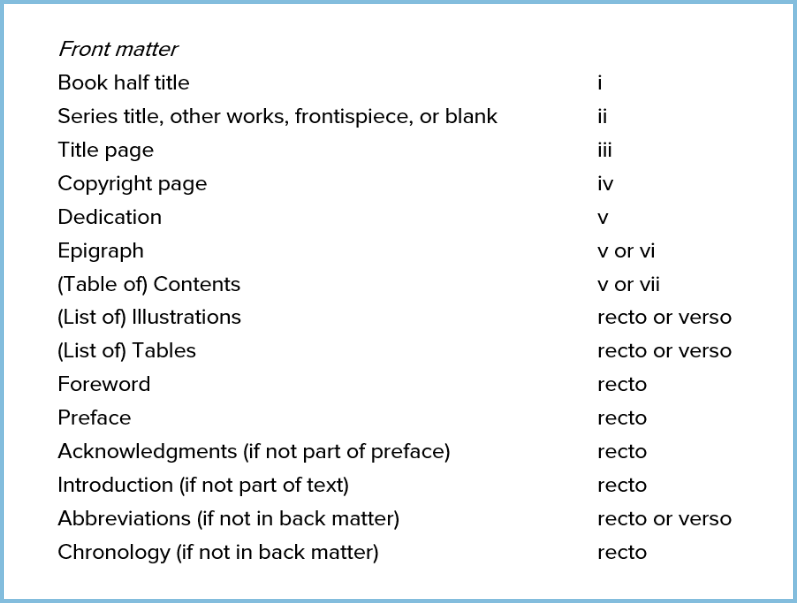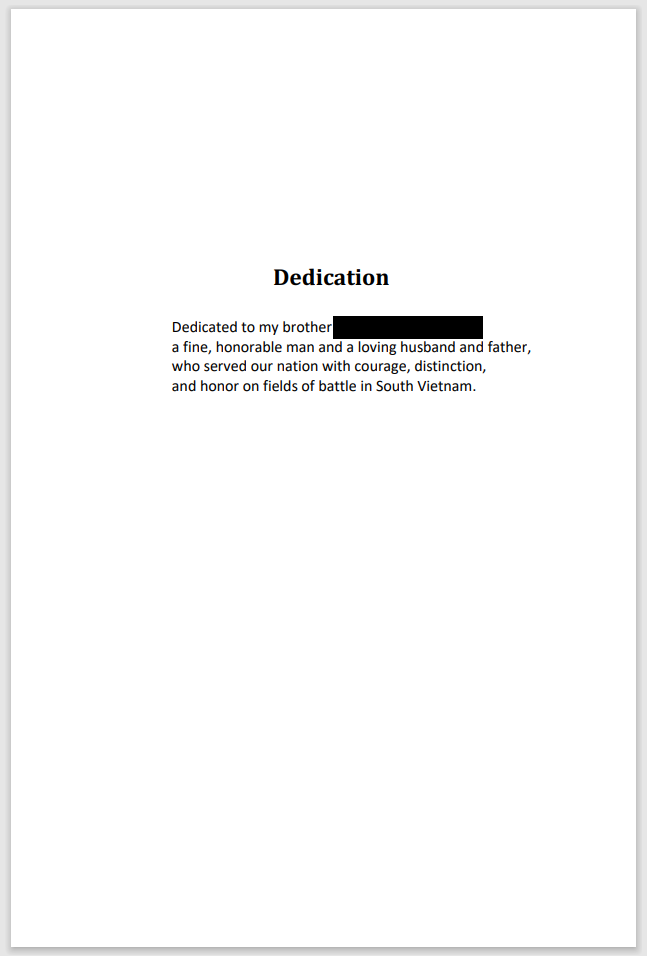How to Write a Book Dedication
You’re writing your book and applying the finishing touches. You’re about ready to get this thing published. You may be anxious, excited, or just ready to be done with it.
But there’s one little nagging thing that you haven’t done yet: write a book dedication.
If you’ve found this article, you’re probably wondering such things as . . .
What is a book dedication? (When) do you need a book dedication page? How do you write a dedication? Where does the dedication page go in a book? Who should I dedicate my book to? Where can I find book dedication examples?
So, the book dedication: What is it? Should you have one? How should you write it? What to remember, and some samples for inspiration? I got you, friend.
Read on for more on book dedications, sparked by conversations I’ve had with one of the first clients I worked with as a book publishing coach for American nonfiction authors and with the students who’ve taken my on-demand courses on self-publishing a book and getting published with a traditional book publisher.
Along the way, I’ll share tips and thoughts from authors and readers that I curated from various threads on r/writing.
What is the dedication in a book and what is its purpose?
A book dedication is a short note of thanks meant to pay tribute/express gratitude to a person, to people, to a group, or to a cause that the author wishes to recognize. It appears on its own separate page in the front of a book.
Dedication page vs. acknowledgments: What is the difference?
Formality: A dedication is more intimate and selective. Whether or not the author acknowledgments section takes on a more formal tone, as is often the case, it is meant to call out multiple people who helped with the book.
Length: A dedication is typically 1–2 lines. An acknowledgments section is often 1–2 pages. The dedication goes in the front of the book. It goes before the table of contents and is not included in the table of contents.
Where it goes in the book: The acknowledgments can go in the front of the book or at the end of the book. Either way, it is listed in the table of contents.
Do I need a dedication page?
According to The Chicago Manual of Style (CMOS), §1.36, “Choice of dedication—including whether to include one—is up to the author.”
How to write a dedication page
There is no specific formula for a book dedication. How you wish to write it is entirely up to you.
Generally speaking, keep it short and sweet. Most book dedications take up no more than a few lines. C. S. Lewis’s dedication in The Lion, the Witch and the Wardrobe, at 111 words long, is an exception!
Feel free to show your personality and to be creative with it. I will link to some creative book dedications later on in this article.
Some authors write a dedication as if giving a toast—it’s as if you’re raising a glass to [fill in the blank].
You might say something heartfelt, funny, eclectic, or otherwise memorable.
“It may be suggested,” however, as The Chicago Manual notes, “that the word dedicated is superfluous” (§1.36).
There’s no need to include the words “This book is dedicated to . . .” or “Dedicated to . . .”
A book dedication begins with “To . . .” or “For . . .”
Then name the person, people, group, or cause that you’re dedicating the book to.
Then, if you want to, you can explain why. There is no one way to do this, so whatever works for you!
The dedication should sound like you.
Here are some things to avoid when writing a dedication:
Avoid saying something offensive—a cheap-shot, backhanded compliment, or dig. This rarely works, except maybe in humor books or if that’s truly your personality and it fits the book.
Avoid being overly vague. You may want to use someone’s first name or nickname. But avoid using initials or some kind of inside joke. If you do that, readers may feel left out.
Don’t use superfluous words like “This book is dedicated to . . .” or “Dedicated to . . .” or “I dedicate this book to . . .”
Avoid rambling in any way. Save that for acknowledgments.
Stay clear of overly flowery, sappy language. As one Redditor, AdamBertocci-Writer, puts it, “[M]y view for a tasteful dedication would be this: pretend your friend wrote the dedication for HIS wife, children, mentor, whatever. Switch out the names [and put in your own]. Now ask yourself if you’d mock your friend for his purple prose, or if you’d go ‘Aw, that’s nice.’”
Where does the dedication page go in a book?
The book dedication page is one of the parts of a book that appears in the “front matter”—towards the beginning of your book, before the main body of text.
There’s this from The Chicago Manual, which defines the industry standards for most published books:
“The dedication usually appears by itself, preferably on page v” (§1.36).
This is a page on the right-hand side of a print book. These rules can be broken for ebook formats; typically there aren’t blank pages.
(Page numbering in the front matter is in lowercase roman numerals.)
Your page numbering should look something like this:
Where does the dedication page go in a book? Here’s the page numbering for front matter, as specified by The Chicago Manual of Style.
Also from The Chicago Manual of Style (§1.37) is the following, paraphrased:
If you do NOT include a dedication but you DO include an epigraph at the beginning of the book, then that would go on page v.
If you include a dedication AND you include “an epigraph—a quotation that is pertinent but not integral to the text—at the beginning of the book,” then the epigraph goes on page vi, on the back side of the page containing the dedication. It is immediately followed by the table of contents on page vii.
If you have neither a dedication nor an epigraph, then your table of contents will likely begin on page v, not vii.
From The Chicago Manual of Style, §1.38, we learn that “The table of contents for a printed work usually begins on page v or, if page v carries a dedication or an epigraph, page vii.”
“It should include all preliminary material that follows it but exclude anything that precedes it.” In other words, if there is a dedication, it is NOT listed in the table of contents. If there is an epigraph, it too is NOT listed in the table of contents.
How do I format the dedication for my book?
If you’re traditionally published, the formatting, layout, and design will be done for you according to your publisher’s preferences, so don’t sweat what it looks like when you submit the manuscript.
If you’re self-publishing, here’s what to know. The Chicago Manual doesn’t specifically state this, but . . .
The dedication is usually
centered
about one-third of the way down the page
set in a slightly different and/or slightly larger font than the main text of the book (i.e., if your book is in 11-point font, try a 13- or 14-point font for the dedication)
A sample of a book dedication at the page proof stage. The Chicago Manual says that “Dedicated to” is unnecessary. Note where the dedication is placed on the page. I blacked out the identifying information.
Who should I dedicate my book to?
There’s no right or wrong choice, but here are some ideas:
You could dedicate your book to a person, a few people, or a collective group of people who provided inspiration or support while you wrote the book. My clients have dedicated their books to family members (spouse, partner, children, parents, grandparents, grandchildren, nieces and nephews, etc.), friends, an intellectual influence, or someone you admire. It’s not common for authors to dedicate books to their partner/spouse and/or children. “I dedicated my print book to my parents. My mom cried. Be good to your moms, folks. :3,” declared Redditor AdamBertocci-Writer. In Japan’s Military Masters is this dedication from Hillis Lory: “Dedicated to two distracting little daughters, Priscilla, four years old, and Nancy, age two, who were no help in writing this book.”
You could dedicate your book to someone whom you wish were around to see this book published or who died while you were writing the book. In other words, dedicate it in memory of someone who is deceased. “For my mother (1940–2014), who continues to inspire me.”
You could dedicate your book to someone who did (or didn’t) believe in you. “When I publish my bestseller, it [will] be dedicated to my literature teacher who said I will amount to nothing. Cheers,” wrote Redditor Mental_octo.
You could dedicate your book to your reader.
You could dedicate your book to your pet(s).
You could dedicate your book to a person, group, organization, or cause that you’d like to call attention to—if relevant to your book. A hypothetical fitness book dedication by Chad Barbell might be “for my friends at [name of author’s local CrossFit gym].” A hypothetical book about fire safety might be dedicated to fallen firefighters or to victims of a fire.
These are just a few possibilities.
Where to find book dedication examples
For inspiration, look at the books on your bookshelf.
Or go to the library or your local bookstore.
For creative ideas, check out this article: “57 Times Writers Took Book Dedications To Another Level.”
What are the pros and cons of dedications in a book? What do readers think of dedications?
Some, like Redditor VanityInk, have said that “There aren’t really any true advantages or disadvantages” to having a dedication.
I disagree.
Redditor VincentStrangecraft thinks that “If you publish a lot and everything you do has a dedication, it might turn tacky” or lose its significance.
I also disagree.
No one will be keeping track of which books have dedications and which don’t. You can include dedications in some, all, or none of your books. You can certainly dedicate each book to the same person, people, or group, if you like.
The pros of having a dedication page in a book:
Here’s what people said on the Reddit thread “Book Dedications: Tasteful or Tacky?”
Book dedications show gratitude. Book dedications can be a sweet way to acknowledge that special someone (or those special people) in your life.
A dedication reminds readers that you’re a human and gives a glimpse into what matters to you, which they may appreciate.
Readers are likely to read it. As Redditor adeadpenguinswake points out, “everyone reads the dedications,” but not everyone reads the acknowledgments.
“I honestly don't see a downside. . . . [I]t is voluntary to read and amounts to roughly .001% of the time spent reading the rest of the [book],” writes Redditor jrizos.
There’s another thing I can think of:
It can be part of your brand, something you do throughout a series or in each book, something that readers look forward to. Author Neil Gaiman, for example, is known for his creative dedications.
The cons of having a dedication page in a book:
“I've always thought that dedications are more for the author than the reader,” writes Redditor isuckwithusernames.
Unless your book lends itself to a creative dedication, or unless it’s “at least moderately interesting to read,” it won’t offer anything to the reader.
Some people, like Redditor AdamBertocci-Writer, find them “cloying,” “tacky,” and sappy and feel that “Sometimes they come off sounding pompous or presumptuous.”
Even if your dedication is perfectly polite, charmingly sweet, and free of cringe, most readers will skim it faster than a Terms & Conditions page. So why bother? That’s one less page they can preview in the “Look Inside” feature—and one more speed bump between them and the juicy stuff. Save the sentiment for the acknowledgments and let your story do the hugging.
The last word on book dedications
Including a book dedication is purely optional.
Remember, it’s a personal message written to call attention to a person, people, or group that has special significance to the author. That might include, among other things, family, friends, pets, inspirations, deceased individuals, or causes relevant to the book.
It’s best to keep it short (no “dedicated to” is necessary). It’s OK to use humor or creativity. It goes in the front matter before the table of contents but it is not listed in the table of contents.
There are some pros and cons to including a book dedication, but it probably won’t matter to your reader if you do or don’t have one; they probably won’t think much of it one way or another.
Book dedications are read by many. But they’re also quickly forgotten.
Nonetheless, if there’s something you want them to see, feel, or react to—or if there’s something you can say that sets a tone for the book or helps them understand you or the book better—then go for it.
Redditor cromethus sums it up best: “Dedications are something you shouldn't feel forced into. If you do them, they should be tasteful and short - just long enough that the person you are dedicating it to knows that it's them.”
Try not to sweat it too much. And remember, each book is a new adventure, when you’ll face the decision of how to write your book dedication all over again!
Thanks, friend, and congratulations on your upcoming publishing book.



